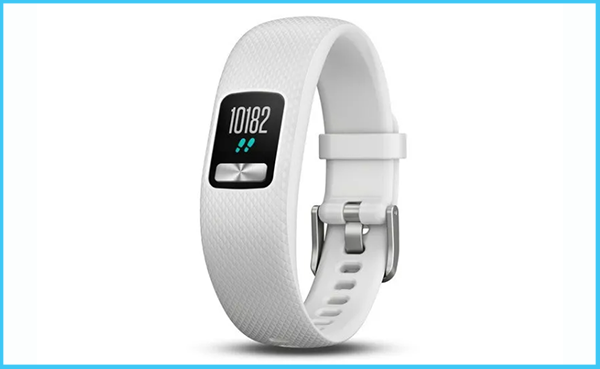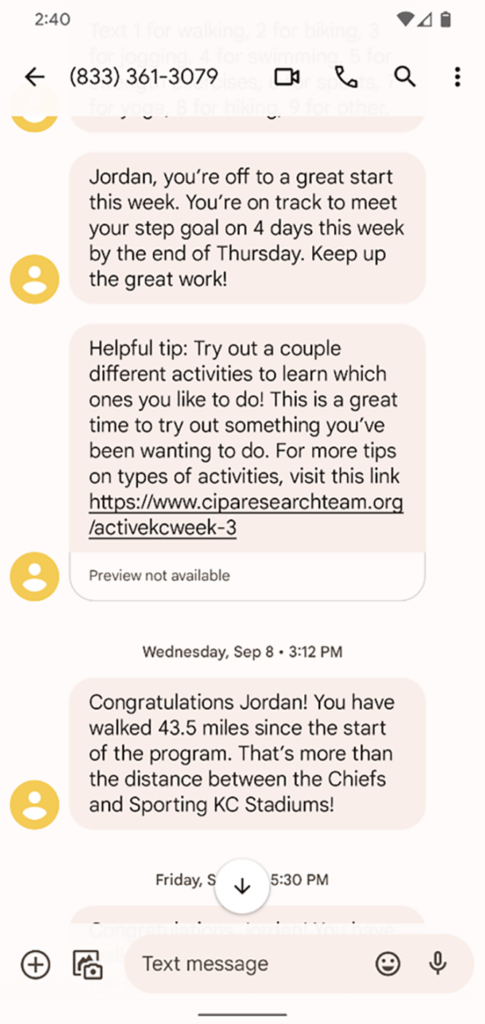
Providing opportunities and support to children facing economic and structural health barriers to physical activity is critical for preventing and controlling the high rates of type 2 diabetes and cardiovascular disease. This disproportionally impacts the African American community and other Kansas City communities that face economic and structural barriers to health. To address these health disparities, community-based researchers at Children’s Mercy have been using consumer wearable step trackers and SMS text messaging to support physical activity among community residents.
When the pandemic caused elementary schools to move to remote education, Dr. Carlson’s team knew children’s physical activity would be negatively impacted. His team developed the Stay Active Program for schools and families that involved physical activity ‘breaks’ delivered to classrooms over the school’s video conferencing platform and Garmin wearables linked with automated SMS delivered to children and caregivers. The system was developed in partnership with Children’s Mercy’s Research Informatics team and integrated the Garmin Health Application Programming Interface (API) and an SMS API. The system customizes each SMS message based on the child’s step counts and facilitates goal monitoring and support.
“The Stay Active Program had positive impacts on children’s physical activity, and children and caregivers enjoyed using the information from the Garmin and motivational SMS messages,” Carlson said.
 To expand the reach of these efforts, Carlson’s team created an updated version of the Garmin + SMS system. It is offered to community residents of all ages at health fairs and COVID vaccination events in Kansas City’s east side neighborhoods. The 8-week program was named ‘Active KC.’ “We set out to learn how to best design and frame a digital physical activity promotion program for communities facing structural barriers and inequities. There was more interest in Active KC than we could have imagined, and we ended up providing the program to over 180 residents until we ran out of Garmin watches,” said Carlson.
To expand the reach of these efforts, Carlson’s team created an updated version of the Garmin + SMS system. It is offered to community residents of all ages at health fairs and COVID vaccination events in Kansas City’s east side neighborhoods. The 8-week program was named ‘Active KC.’ “We set out to learn how to best design and frame a digital physical activity promotion program for communities facing structural barriers and inequities. There was more interest in Active KC than we could have imagined, and we ended up providing the program to over 180 residents until we ran out of Garmin watches,” said Carlson.
Active KC uses theory-based concepts that have been shown repeatedly to help individuals increase their physical activity, including goal setting, monitoring, motivational support, and problem-solving. SMS messages are sent five days each week. Most are customized based on each person’s daily, weekly, or cumulative step counts, and some involve two-way SMS with a tree of messages determined based on the person’s choices. Dozens of participants were interviewed to learn how to refine the Active KC program for improved fit and reach. The next version of the program is in the works and will be integrated with a broader diabetes prevention program that involves multiple layers of support.
“We know wearing a Garmin watch and receiving automated SMS messages won’t be sufficient for everyone, but we think tools like this can be essential components of multi-component health promotion programs.”
By: Children’s Mercy